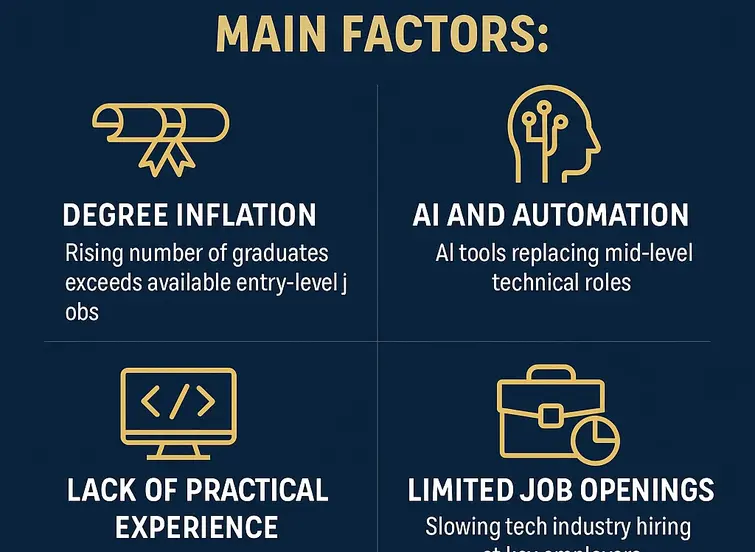In a world driven by code, automation, and artificial intelligence, a degree in computer science and engineering has long been seen as a golden ticket to a lucrative and stable career. Yet in 2025, an unexpected trend is unfolding: many computer science and engineering graduates are struggling to land jobs in their fields even as companies continue to post tech vacancies.
Why is a generation of highly skilled tech professionals facing underemployment, layoffs, and stalling career starts? This article investigates the growing disconnect between education and industry in one of the world’s most in-demand sectors.
Table of Contents
The Paradox: High Demand, High Unemployment
According to recent data from the National Association of Colleges and Employers (NACE), nearly 1 in 4 recent computer science and engineering graduates is unemployed or working in non-technical roles in 2025—despite the tech industry’s continued expansion.
This is up from just 1 in 10 in 2019. In contrast, many bootcamp graduates and self-taught developers are securing roles in startups, SaaS companies, and AI-driven businesses with greater ease.
Source: TechCrunch – The Class of 2025 Is Facing a Broken Hiring Pipeline

What’s Driving the Disconnect?
1. Degree Inflation and Skills Misalignment
Universities are graduating record numbers of CS and engineering majors. Yet many programs focus on theoretical learning rather than hands-on skills like Git, APIs, CI/CD, or AI deployment pipelines.
“We see grads with excellent GPAs who’ve never worked on a live codebase,” says Tasha Nguyen, Lead Technical Recruiter at a cloud infrastructure startup.
Startups and mid-size companies want candidates with demonstrable experience and a portfolio—not just a diploma.
2. AI Is Shifting Job Requirements
Large Language Models (LLMs) and generative AI tools are automating routine coding, debugging, and even basic UI design. As a result, the demand for “pure coders” is flattening, while companies seek hybrid talent who understand systems thinking, ethics, design, and business logic.
Source: MIT Technology Review – AI Is Changing What It Means to Be a Software Engineer
3. Internship Gaps Post-Pandemic
Many students lost internship opportunities during the COVID-19 disruption in 2020–2022, meaning they graduated with weaker résumés and fewer real-world connections.
Without experience, even strong candidates are getting filtered out by Applicant Tracking Systems (ATS) or AI screeners.
4. Oversaturation in Traditional Career Pathways
Large tech firms like Google, Meta, and Amazon have significantly slowed entry-level hiring, prioritizing AI roles and internal automation. Meanwhile, thousands of CS graduates are still applying for a shrinking pool of junior developer positions.
The Bootcamp Advantage?
Surprisingly, coding bootcamp grads are landing roles faster in many regions. Why?
- They train on current technologies like React, Docker, and TypeScript
- They build public project portfolios on GitHub
- They emphasize practical application and often simulate job-like environments
- Programs often include career coaching and job placement support
This “job-ready” model is gaining favor with employers eager to reduce onboarding and training costs.
Source: Course Report – 2025 Bootcamp Outcomes Study
🚀 Explore Top Jobs on WhatJobs
Looking for your next career move?
Discover trending opportunities in Computer Science, Engineering, Technology, and Research even in today’s competitive employment landscape.
WhatJobs helps you stay ahead by connecting you with in-demand roles that drive innovation and career growth.
👉 Browse top tech and engineering jobs now — and take control of your future.Where the Jobs Actually Are
Despite challenges, demand is growing in specific areas—just not always in traditional software dev roles:
- Cybersecurity – With global threats on the rise, demand for ethical hackers, SOC analysts, and compliance engineers is skyrocketing.
- AI Infrastructure & Ethics – Companies want engineers to build, audit, and maintain safe AI systems.
- DevOps & Site Reliability Engineering (SRE) – These roles ensure that modern applications scale and remain secure.
- Data Engineering & ML Ops – Critical for making sense of data pipelines and deploying AI models at scale.
- Tech-Enabled Non-Tech Roles – Many grads are thriving in product management, data visualization, and customer solutions engineering.
Source: U.S. Bureau of Labor Statistics – Computer Occupations Outlook
What Can Students and Grads Do Differently?
1. Build a Portfolio
Contribute to open-source projects, publish code on GitHub, and build personal apps. Employers often review public repositories before reaching out.
2. Focus on Internships & Apprenticeships
Even small freelance projects or open-source contributions can stand out. Real-world experience trumps coursework in today’s job market.
3. Learn the Business Side
CS grads with knowledge of user experience (UX), stakeholder management, or product strategy are often favored by hiring teams.
4. Upskill in Adjacent Areas
Certifications in cloud services (AWS, Azure), data engineering, or AI/ML operations are increasingly valuable.
Source: LinkedIn Learning – 2025 Top Tech Skills
Final Thoughts: Time to Rethink the STEM Promise
Computer science and engineering degrees remain powerful credentials—but the rules of the game have changed. With AI reshaping the nature of technical work, universities, employers, and students must realign expectations and training methods.
The new tech workforce will not be defined by degrees alone—but by adaptability, hands-on experience, and the ability to evolve as fast as technology itself.
Stay ahead of hiring trends and career shifts in tech at WhatJobs News
FAQs
Q: Are CS and engineering degrees still worth it?
A: Yes—but students must complement them with real-world experience, soft skills, and evolving technologies. The degree opens doors, but practical ability gets you hired.
Q: Which tech degrees face the most difficulty?
A: Generalist CS degrees without specialization or applied skills face the most competition. Fields like biomedical or environmental engineering have fewer applicants and clearer industry paths.
Q: Do bootcamps really compete with four-year programs?
A: For certain job types, yes. Bootcamps can produce job-ready graduates in 3–6 months, especially for frontend and full-stack developer roles.
Q: Should students shift to AI or data science?
A: Possibly. AI, data science, and cybersecurity are growth sectors—but they’re competitive and require continuous learning. Career guidance should focus on aptitude, not trends alone.




